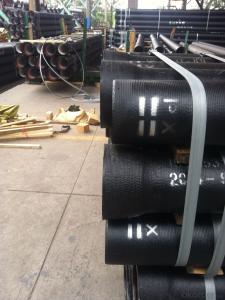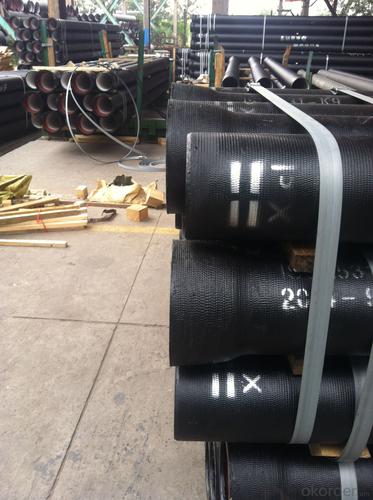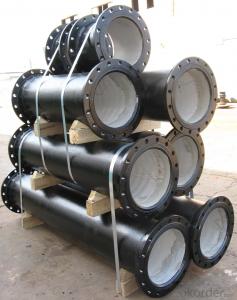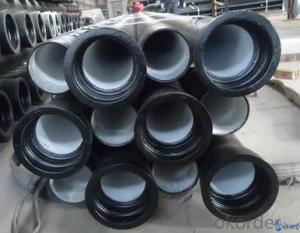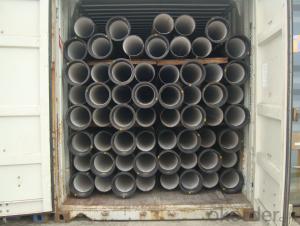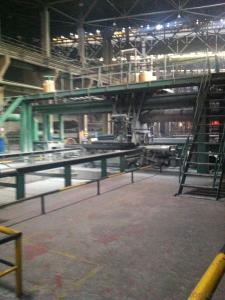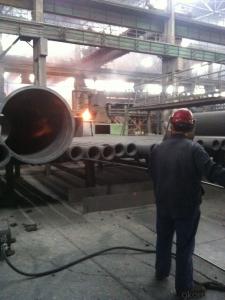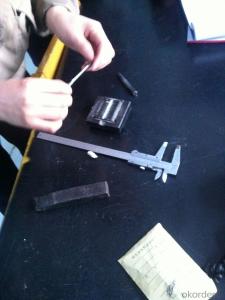DUCTILE IRON PIPE AND PIPE FITTINGS K8 CLASS DN900
- Loading Port:
- Tianjin
- Payment Terms:
- TT OR LC
- Min Order Qty:
- 23 pc
- Supply Capability:
- 3000 pc/month
OKorder Service Pledge
OKorder Financial Service
You Might Also Like
Material : Ductile Cast Iron
Size Range : DN 80mm to DN 2000mm
Unit Effective Length : 6m or 5.7m
Manufacture Standard: ISO 2531:1998/ EN 545:2006/EN 598:2007
Annual capacity : 200,000 tons
Coating Exterior: Zinc 130g/m2 according to ISO 8179-1 and bitumen coating 70 microns.
Cement Interior: Portland Cement/ High Alumina Cement/ Sulphate Resisting Cement Lining according to ISO 4179
Special requirements on external coating and internal lining can be applied
We also provide accessories such as SBR/EPDM rubber gaskets, lubricant paste, pipe caps, PE sleeves, etc.
Additional Parts:
Each pipe is strictly inspected according to related standard to ensure permanently high performance.
Easy Installation at site and service free for life
Long Service Lifespan
Quotation will arrive you within 24hours once we get your inquiry.
We guarantee offering you a competitive price.
A copy of original inspection reports of pipes will be offered after shipment.
Photos of loading process will be sent to the customer after shipment effect.
We will follow-up the delivery progress after shipment effect and update to the customer on weekly basis.
- Q: Can ductile iron pipes be used for water supply in remote areas?
- Yes, ductile iron pipes can be used for water supply in remote areas. Ductile iron pipes are known for their strength, durability, and versatility, making them suitable for various applications, including water supply systems. These pipes have a high resistance to corrosion and can withstand harsh environmental conditions, making them ideal for remote areas where the availability of maintenance and repair services may be limited. Additionally, ductile iron pipes have a longer lifespan compared to other materials, ensuring the longevity of the water supply system in remote areas. Overall, ductile iron pipes are a reliable choice for water supply in remote areas due to their durability, corrosion resistance, and long lifespan.
- Q: How do ductile iron pipes handle heavy traffic loads?
- Ductile iron pipes possess exceptional durability and have the ability to effortlessly withstand heavy traffic loads. This is primarily attributed to their remarkable strength and flexibility. The incorporation of graphite nodules in the composition of ductile iron allows for greater flexibility compared to traditional cast iron pipes. This enhanced flexibility empowers the pipes to endure substantial traffic loads, including the weight of vehicles traversing over them. Moreover, ductile iron pipes exhibit an elevated load-bearing capacity, enabling them to bear significant weights without experiencing any deformation or structural failure. Consequently, they are well-suited for deployment in areas characterized by heavy traffic, such as highways, bridges, and industrial sites. Furthermore, ductile iron pipes showcase exceptional resistance to external forces, such as vibrations and impacts. These pipes can effectively absorb and distribute these forces across the entire pipe network, thereby averting any potential damage and preserving the overall structural integrity. In conclusion, ductile iron pipes are explicitly engineered to manage the demands imposed by heavy traffic loads. Their strength, flexibility, and load-bearing capacity render them a dependable choice for infrastructure projects where durability and longevity are of utmost importance.
- Q: Can ductile iron pipe be used for both water and wastewater applications?
- Yes, ductile iron pipe can be used for both water and wastewater applications. Ductile iron is a type of iron that has been treated with small amounts of magnesium to create a more flexible and durable material. This makes it suitable for transporting both water and wastewater. Ductile iron pipes are known for their high strength and resistance to corrosion, making them ideal for underground applications. They can handle the high pressures and varying flow rates associated with water distribution systems, as well as the corrosive nature of wastewater. Additionally, ductile iron pipes have a longer lifespan compared to other materials commonly used in water and wastewater applications, such as PVC or concrete. Therefore, they are often chosen for projects that require a reliable and long-lasting pipe material for both water and wastewater transport.
- Q: Which is better, ductile iron pipe and spray plastic pipe?
- Spray pipe is: plastic composite pipe, steel pipe is a new composite material as matrix, through a special process in high temperature curing by walls melt spraying or adsorption of food grade epoxy powder coating or PE as raw material. It has excellent corrosion resistance and relatively small frictional resistance.
- Q: How do ductile iron pipes handle soil erosion?
- Ductile iron pipes are highly resistant to soil erosion due to their robust construction and inherent strength. The pipes' durable and flexible nature allows them to withstand the impact of soil movement and erosion without significant damage. Moreover, the corrosion-resistant coatings applied to ductile iron pipes further enhance their ability to resist erosion caused by soil particles and other corrosive elements. Overall, ductile iron pipes provide a reliable and long-lasting solution for handling soil erosion in various applications.
- Q: Can ductile iron pipes be used for underground sewage systems?
- Yes, ductile iron pipes can be used for underground sewage systems. Ductile iron is a type of cast iron that has enhanced flexibility and strength, making it suitable for various applications, including sewage systems. Ductile iron pipes offer several advantages for underground sewage systems. Firstly, they have excellent corrosion resistance, which is crucial in sewage systems where the presence of moisture and chemicals can cause corrosion over time. This resistance to corrosion ensures the long-term durability and reliability of the pipes. Secondly, ductile iron pipes have high tensile strength, allowing them to withstand the pressure and stress that can occur in underground sewage systems. They are resistant to ground movements, such as soil settling or shifting, which can cause damage to other types of pipes. Furthermore, ductile iron pipes have a smooth internal surface, which results in a better flow capacity and reduces the likelihood of clogging or blockages in the sewage system. This smooth surface also helps to minimize the accumulation of debris and sediment, reducing the need for frequent maintenance and cleaning. Another important factor is that ductile iron pipes are available in various sizes and can easily be connected using a range of joint systems, allowing for flexibility in designing and constructing underground sewage systems. In summary, ductile iron pipes are an excellent choice for underground sewage systems due to their corrosion resistance, high tensile strength, smooth internal surface, and ease of installation.
- Q: Can ductile iron pipes be used for underground chemical processing systems?
- Ductile iron pipes are generally not recommended for use in underground chemical processing systems due to their limited resistance to corrosion from various chemicals. While ductile iron pipes are known for their strength, durability, and flexibility, they are still vulnerable to corrosion when exposed to certain chemicals, especially those with high acidity or alkalinity. In underground chemical processing systems, there is a higher risk of exposure to corrosive substances that can deteriorate the ductile iron pipes over time. This can lead to leaks, cracks, and failures in the piping system, compromising its integrity and potentially causing hazardous conditions. For underground chemical processing systems, it is advisable to consider alternative materials that are more resistant to corrosion, such as stainless steel, PVC, or high-density polyethylene (HDPE) pipes. These materials offer superior chemical resistance and can withstand the harsh conditions typically present in chemical processing environments. It is crucial to consult with experts in chemical engineering, piping design, and corrosion resistance to determine the most suitable materials for underground chemical processing systems. Proper material selection is vital to ensure the longevity and safety of the piping infrastructure in such environments.
- Q: Can ductile iron pipe be recycled?
- Yes, ductile iron pipe can be recycled. It is a highly recyclable material that can be melted down and reused in the production of new ductile iron products. Recycling ductile iron pipe helps reduce waste and conserves natural resources.
- Q: Can ductile iron pipes be used for water treatment facilities?
- Water treatment facilities can utilize ductile iron pipes. Ductile iron, a type of cast iron, boasts improved strength, flexibility, and durability. These characteristics render it suitable for a range of applications, including water treatment facilities. Ductile iron pipes exhibit exceptional resistance to corrosion, a crucial attribute for water treatment facilities where pipes come into contact with various chemicals and water contaminants. They can endure the demanding conditions and chemicals inherent in water treatment processes, ensuring a lengthy lifespan. Additionally, ductile iron pipes possess high tensile strength and can withstand elevated pressures. This makes them ideal for conveying water throughout the facility, encompassing the distribution system, pumping stations, and treatment units. They can handle the required flow rates and pressures without compromising pipe integrity. Furthermore, ductile iron pipes are renowned for their flexibility and resilience. They can tolerate ground movement and other external stresses, diminishing the likelihood of pipe failures and leaks. This proves invaluable in water treatment facilities where pipes frequently traverse diverse terrains and undergo regular maintenance activities. Moreover, ductile iron pipes offer cost-effective advantages over alternative pipe materials such as steel or PVC. They boast an extended lifespan, necessitate minimal maintenance, and exhibit low failure rates, thereby reducing overall operational and maintenance expenses for water treatment facilities. In conclusion, ductile iron pipes provide a dependable and durable solution for water treatment facilities. Their corrosion resistance, high tensile strength, flexibility, and cost-effectiveness render them a suitable choice for transporting water and chemicals within the facility, ensuring efficient and effective water treatment processes.
- Q: What is the expected pressure class for ductile iron pipes?
- The pressure class anticipated for ductile iron pipes may differ based on the particular use and project needs. In a general sense, ductile iron pipes are engineered to manage high-pressure situations and are typically offered in pressure classes spanning from 150 psi to 350 psi. These pressure classes signify the utmost operational pressure that the pipe can endure while preserving its structural soundness. To ascertain the suitable pressure class for ductile iron pipes in a specific scenario, it is crucial to refer to industry standards, guidelines, and project specifications.
Send your message to us
DUCTILE IRON PIPE AND PIPE FITTINGS K8 CLASS DN900
- Loading Port:
- Tianjin
- Payment Terms:
- TT OR LC
- Min Order Qty:
- 23 pc
- Supply Capability:
- 3000 pc/month
OKorder Service Pledge
OKorder Financial Service
Similar products
Hot products
Hot Searches
Related keywords
